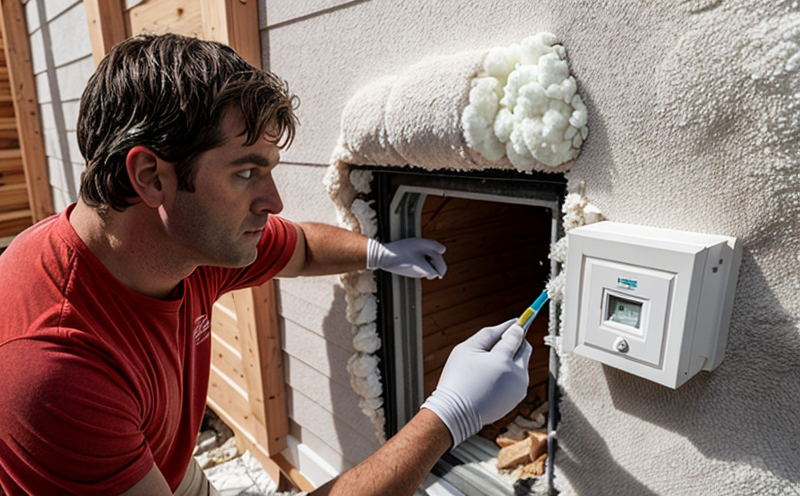ISO 12086 Thermal Resistance of Pipe Insulation
The ISO 12086 standard specifies a method for determining the thermal resistance (R-value) of insulating materials used around pipes. This testing is critical in building and infrastructure projects where efficient heat retention or dissipation is paramount, such as in HVAC systems, water distribution networks, and industrial piping.
The test measures how effectively an insulating material resists the transfer of heat through a pipe section under specified conditions. The results are essential for ensuring compliance with building codes and standards that demand energy-efficient materials to minimize heating or cooling losses.
Accurate thermal resistance testing is particularly important in industries like construction, HVAC manufacturing, and industrial process management. By providing precise data on the insulating properties of pipe materials, ISO 12086 helps manufacturers select appropriate insulation for their products and helps engineers design systems that optimize energy efficiency without compromising safety or performance.
The test setup involves placing a section of insulated pipe in a controlled environment where heat transfer is measured. The apparatus typically includes heaters, temperature sensors, and calorimetric equipment to ensure accurate measurements. Specimens are carefully prepared according to the standard’s instructions, ensuring that any variables affecting thermal resistance are minimized.
Once the test is conducted, detailed reports are generated, providing thermal resistance values along with other relevant parameters such as moisture content, density, and thickness of the insulation material. These data points help in validating product specifications and aiding in quality control processes.
The ISO 12086 standard ensures consistency across different testing labs worldwide, allowing for accurate comparisons and ensuring that all parties involved are working with reliable, comparable data. This is especially important given the global nature of supply chains and the need for consistent performance metrics across international markets.
Understanding the real-world implications of thermal resistance in pipe insulation involves considering factors like ambient temperature variations, pipe diameter, material composition, and application-specific requirements. By adhering to ISO 12086, labs can provide accurate assessments that help stakeholders make informed decisions regarding their projects' design and implementation.
For quality managers, compliance officers, R&D engineers, and procurement specialists in the building & infrastructure sector, understanding these nuances is crucial for optimizing energy efficiency while ensuring safety and performance. Proper thermal insulation not only reduces operational costs but also contributes to environmental sustainability by minimizing greenhouse gas emissions from heating or cooling systems.
Why It Matters
The importance of accurate thermal resistance testing cannot be overstated, especially in sectors where energy efficiency is a key concern. Properly insulating pipes can lead to significant savings on utility bills and reduce the environmental impact associated with excessive heating or cooling.
- Energy Efficiency: Insulation reduces heat loss from hot water pipes and cold gain in chilled water lines, leading to lower energy consumption for buildings.
- Cost Savings: By minimizing unnecessary energy use, organizations can realize substantial reductions in operational costs over time.
- Sustainability: Efficient thermal management contributes positively to overall sustainability goals by reducing reliance on fossil fuels and lowering carbon footprints.
In addition to these benefits, compliance with relevant standards such as ISO 12086 ensures that products meet industry benchmarks and are suitable for use in diverse applications. This not only enhances brand reputation but also fosters trust among clients and stakeholders.
Environmental and Sustainability Contributions
The testing of thermal resistance according to ISO 12086 plays a crucial role in promoting environmental sustainability by helping minimize energy waste and reduce greenhouse gas emissions. Here are some specific ways this contributes:
- Reduced Carbon Footprint: Efficient insulating materials help maintain desired temperatures with less reliance on external heating or cooling sources, thereby decreasing the overall carbon footprint.
- Resource Conservation: By optimizing energy usage through better insulation practices, resources like natural gas and electricity are conserved, which supports long-term conservation efforts.
- Better Resource Management: The standard ensures that materials used in insulating pipes are selected based on their thermal performance rather than other less relevant criteria, leading to more efficient resource allocation.
Incorporating ISO 12086 into your testing protocols can thus play a vital role in supporting broader sustainability initiatives within both individual organizations and larger communities.
Competitive Advantage and Market Impact
Adopting ISO 12086 thermal resistance testing offers several competitive advantages that can significantly impact market positioning:
- Innovation Leadership: By staying ahead of regulatory requirements, companies demonstrate their commitment to innovation and quality, setting them apart from competitors.
- Customer Satisfaction: Providing reliable data on the performance of insulating materials enhances customer confidence, leading to increased satisfaction and loyalty.
- Regulatory Compliance: Ensuring compliance with international standards like ISO 12086 can open up new markets for companies operating in regions that mandate such adherence.
In addition to these direct benefits, investing in robust testing methods can also foster collaboration opportunities within the industry and contribute to setting global benchmarks. This proactive approach not only strengthens a company’s position but also encourages broader adoption of best practices across the sector.





